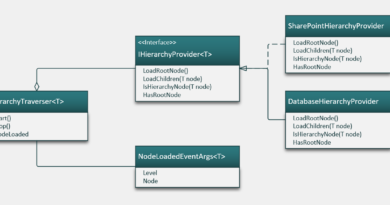Complex numbers with C#
.Net Framework 4.0 Beta 2 introduces new class in System.Numerics namespace: Complex. Complex represents complex numbers and enables different arithmetic operations with complex numbers. In this posting I will show you how to use complex numbers in .Net Framework 4.0 applications.
Complex class has two constructors – one of them has no arguments and the other takes real and complex parts of complex number. Complex numbers have also properties for phase and magnitude. Let’s see the following code.
static void Main(string[] args)
{
var z1 = new Complex(); // this creates complex zero (0, 0)
var z2 = new Complex(2, 4);
var z3 = new Complex(3, 5);
Console.WriteLine("Complex zero: " + z1);
Console.WriteLine(z2 + " + " + z3 + " = " + (z2 + z3));
Console.WriteLine("|z2| = " + z2.Magnitude);
Console.WriteLine("Phase of z2 = " + z2.Phase);
Console.ReadLine();
}
The output of this code is as follows.
Complex zero: (0, 0)
(2, 4) + (3, 5) = (5, 9)
|z2| = 4,47213595499958
Phase of z2 = 1,10714871779409As you can see from output there are some cool things:
- ToString() method of complex number formats complex number like in calculus courses in University (it is called Cartesian form).
- You can use complex numbers like any other numbers and use usual operators on them.
If you feel that this is not good for some reason then you can also use static methods of Complex like Add(), Divide() etc. Following example illustrates how to use methods for calculations.
static void Main(string[] args)
{
var z2 = new Complex(2, 4);
var z3 = new Complex(3, 5);
var z4 = Complex.Add(z2, z3);
var z5 = Complex.Subtract(z2, z3);
var z6 = Complex.Multiply(z2, z3);
var z7 = Complex.Divide(z2, z3);
Console.WriteLine("z2 + z3 = " + z4);
Console.WriteLine("z2 - z3 = " + z5);
Console.WriteLine("z2 * z3 = " + z6);
Console.WriteLine("z2 / z3 = " + z7);
Console.ReadLine();
}
This example produces the following output.
z2 + z3 = (5, 9)
z2 - z3 = (-1, -1) z2 * z3 = (-14, 22) z2 / z3 = (0,764705882352941, 0,0588235294117647)
There are also other mathematical operations defined for complex numbers like trigonometric ones and logarithms, so you can do basically everything you like with complex numbers. I found one thing missing – Parse() and TryParse() methods. Let’s hope these methods are available in stable version of .Net Framework 4.0.






Interesting… but I don’t find this sort of “functionality” worth of being added as part of the framework core… unless it accesses native CPU instructions specially designed for working with complex numbers, of course.
@Héctor: I disagree. By that argument, *nothing* is worth adding to the framework core unless you use it.
Without the new System.Numerics classes, anyone who needs to manipulate complex numbers or arbitrarily large integers has to roll their own version of the code. Two assemblies using different implementations of a complex number can’t work together.
By adding these classes to the CLR, everyone can use the same implementation, without having to re-invent the wheel.
Thanks for comments guys! :)
I want to add one more point to RichardD’s ones. There are a lot of applications that use complex numbers and it is very good if framework also supports some more advanced calculus stuff.
Woo.
I agree that adding this type of stuff to the Framework is very useful. It is something that’s not so specialized that only a few developers would find use for it. It also helps give consistency for applications working with complex numbers in this case.
Yeah… I’m not even sure what the heck this is or what it does but it sounds good :-)
I think the API for complex numbers should be the same as for regular numbers. I want to write code like the following:
Complex x = new Complex(2,3);
Complex y = new Complex(4,5);
Complex a = x + y;
Complex b = x – y;
Complex c = x * y;
Complex d = x / y;
Seems more natural then.
–Bob
@Bob: I think you missed this line in the post:
“You can use complex numbers like any other numbers and use usual operators on them.”
hi
i have been trying to use this class, but i get error “Numerics is not a member of system”. I am not a programer but an engineer. can any body help me resolve this problem.
thanks
You need Visual Studio 2010 to use System.Numerics namespace.Older versions of Visual Studio doesn’t have it.
Yes but in class from Numerics Parse method is missing
so you could show how to write parse method compatible with C# 5 and .Net Framework 4.8
For me it is enough to add dll to the linker /r:System.Numerics.dll
to be able to use Numerics namespace